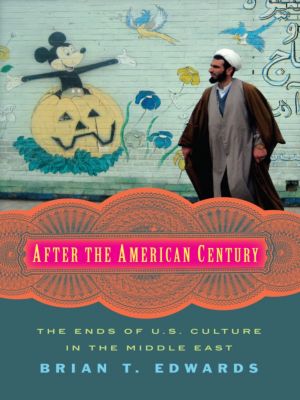After the American Century

- Authors
- Edwards, Brian T.
- Publisher
- Columbia University Press
- Tags
- literary criticism , middle eastern , contemporary , american , general , lit004220 , lit004020
- ISBN
- 9780231540322
- Date
- 1991-11-24T00:00:00+00:00
- Size
- 22.13 MB
- Lang
- en
When Henry Luce announced in 1941 that we were living in an American century," he believed the international popularity of American culture made a world favorable to U.S. interests. For decades, his claim seemed to hold. Now, in the digital twenty-first century, the American century" has been superseded, as American movies, music, video games, and television shows are received, understood, and transformed in unexpected ways. How do we make sense of this shift? Built on a decade of fieldwork in Cairo, Casablanca, and Tehran, Brian T. Edwards maps new routes of cultural exchange that are unpredictable, accelerated, and full of diversions. Shaped by the digital revolution, these paths are entwined with the growing fragility of American soft" power. They indicate an era after the American century, in which popular American products and phenomena, such as comic books, teen romances, social networking sites, and American ways of expressing sexuality, are stripped of...
When Henry Luce announced in 1941 that we were living in the “American century,” he believed that the international popularity of American culture made the world favorable to U.S. interests. Now, in the digital twenty-first century, the American century has been superseded, as American movies, music, video games, and television shows are received, understood, and transformed. How do we make sense of this shift? Building on a decade of fieldwork in Cairo, Casablanca, and Tehran, Brian T. Edwards maps new routes of cultural exchange that are innovative, accelerated, and full of diversions. Shaped by the digital revolution, these paths are entwined with the growing fragility of American “soft” power. They indicate an era after the American century, in which popular American products and phenomena--such as comic books, teen romances, social-networking sites, and ways of expressing sexuality--are stripped of their associations with the United States and recast in very different forms. Arguing against those who talk about a world in which American culture is merely replicated or appropriated, Edwards focuses on creative moments of uptake, in which Arabs and Iranians make something unexpected. He argues that these products do more than extend the reach of the original. They reflect a world in which culture endlessly circulates and gathers new meanings.
The Lost Garden is an eloquent portrait of the losses incurred as we struggle to hold on to our passions. The novel begins with the family of Zhu Yinghong, whose father, Zhu Zuyan, was imprisoned in the early days of Chiang Kai-shek's rule. Zhu Zuyan spends his days luxuriating in his Lotus Garden, which he builds according to his own desires. Forever under suspicion, he indulges as much as he can in circumscribed pleasures, though they drain the family fortune. Eventually the entire household is sold, including the Lotus Garden. The novel then swings to modern-day Taipei, where Zhu Yinghong falls for Lin Xigeng, a real estate tycoon and playboy. Their cat-and-mouse courtship builds against the extravagant banquets and decadent entertainments of Taipei's wealthy businessmen. Though the two ultimately marry, their high-styled romance dulls over time, leading to a dangerous, desperate quest to reclaim the enchantment of the Lotus Garden.